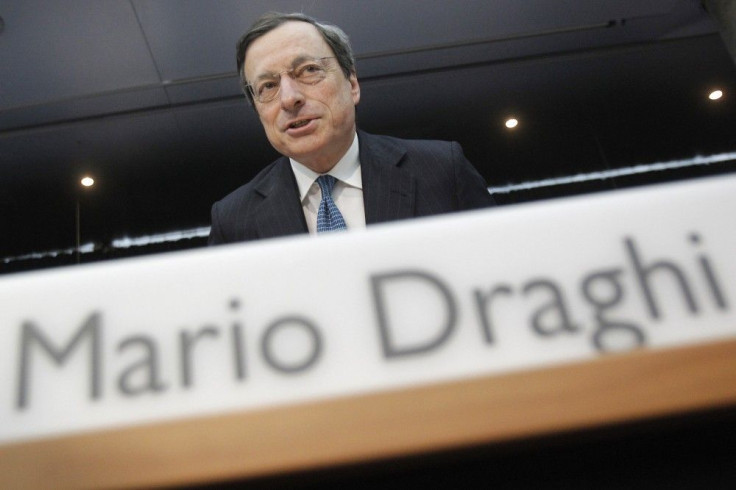ECB Head Mario Draghi In Central Banker 'Hell' After Atrocious News Conference
ANALYSIS

"Policy purgatory."
That's how Mohamed El-Erian, chief executive of giant asset manager PIMCO and one of the world's most eminent analysts on macroeconomics trends, described the place Fed chairman Ben Bernanke and other U.S. central bankers are in at the moment.
But for Benanke's peer across the Atlantic, European Central Bank President Mario Draghi, only having the temporary suffering and purification of a purgatory might be an improvement over where he found himself Thursday, namely policy Hell.
That's because Draghi found himself in policy ell Thursday after disappointing market-watchers at what was the most anticipated and important press conference of his career as a monetary policy leader.
The stakes couldn't have been higher. Last week, in a widely reported speech in London, Draghi said he would "do whatever it takes to preserve the euro," adding "and I promise, that will be enough."
But following the release of the European Central Bank's decision earlier in the day that it was holding rates steady, most expected Draghi to use his post-announcement press conference to perhaps surprise the markets with a new type of unorthodox expansionary measure.
But it was not to be.
Draghi instead repeated boilerplate assurances that the euro was "irreversible," but did not announce any definitive measures. He chided financial journalists, suggesting they had read too much into his comments last week and even castigating a reporter who had to ultimately admit he had not read the speech. And seemingly taking a step back -- at least in the minds of those who expected him to lead highly accommodative action Thursday -- he suggested the ECB would not pursue aggressive buying of sovereign bonds from Europe's faltering economies until after the leaders of those economies go hat in hand to beg for sovereign bailouts from the European Union's various assistance mechanisms.
"Governments must stand ready to activate the EFSF, the ESM in the bond markets under necessary conditions. The adherence of governments to their commitments...and the fulfillment by the EFSF and ESM of their role are the necessary conditions for ECB actions," Draghi said.
On the question of whether the bank would be open to bond-buying in certain particular scenarios, and exactly what those scenarios would be, Draghi was circuitious and noncommittal, saying only the ECB "may act," in crisis situations to undertake outright open market operations.
The level to which Draghi hedged his comments was obvious in the diversity of commentary from bank analysts that followed his latest appearance.
Julian Callow, a European economist at Barclays Capital, wrote a note that said his economics team interpreted Draghi's comments as "a clear sign that the ECB is prepared to change policy significantly at its September meeting, in terms of purchasing debt without claiming seniority subject to the EFSF being deployed to buy government debt." That was the exact opposite, for example, of how the economics team at French bank BNP Paribas called it. In a note that was facetiously titled as "Whatever It Means," BNP said that "once more, the ECB threw the ball back in the politicians' court. A restart of the SMP is possible, but distressed countries have to request help from the EFSF/ESM first."
Regardless of how his comments were seen, they clearly disappointed markets, with equity indices on both sides of the Atlantic dropping sharply as Draghi spoke and the euro dipping under $1.22. Mark Grant, an outspoken managing director at financial adviser Southwest Securities Inc., said that while the market was expecting a "big bang," from the ECB, "there was barely a whimper."
In Draghi's defense, many speculated his performance Thursday was essentially the best he could do given pressures from important political players in Germany to rein in the actions of the central bank. The vote on the bank's statement Thursday had met objection from one unnamed central banker, Draghi said, widely believed to have been Bundesbank president Jens Weidmann.
And Draghi's couched prescription of future bond-buying possibilities was shot down nearly immediately by the Germans. Mere minutes after the end of the press conference, the economic-affairs spokesman for the ruling Christian Democratic Union party criticized the ECB position in an interview with the Dow Jones Newswires, while German economic minister Phillip Roesler said "monetary policy cannot provide a lasting crisis solution."
It seems that for Draghi, in the immortal words of Jean-Paul Sartre, "Hell is the other people."
© Copyright IBTimes 2024. All rights reserved.





















